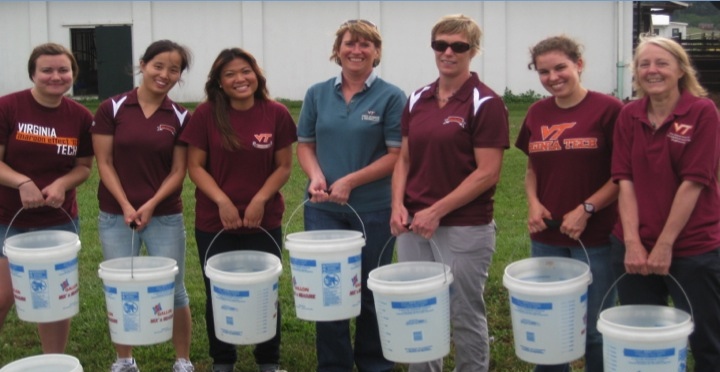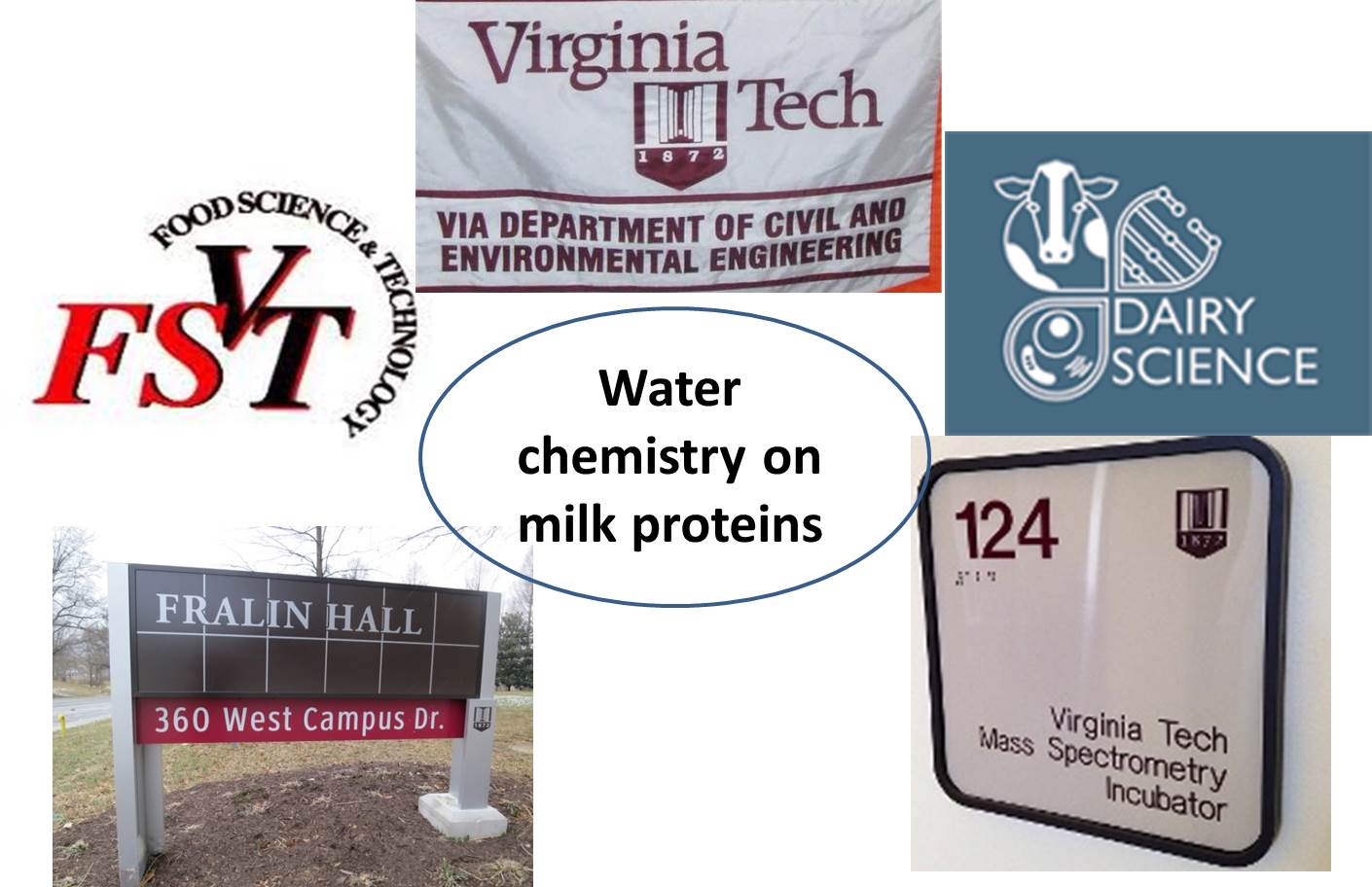Interdisciplinary research- How iron in bovine drinking water influence the quality of milk?

By Aili Wang, Ph.D., Department of Food Science and Technology, member of Water IGEP, Virginia Tech
Do you know that a dairy cow drinks ~100 L of water each day to produce milk? Do you know more than 80% of milk is water? Hmmm, it is amazing to see that cows can turn such a huge amount of ground water into nutritional food. However, if water resources for dairy cattle have high iron content, is the milk still tasty and nutritional for humans?
Water serves as a valuable supply of minerals essential for bovine health. However, some sources can have excess mineral. For example, iron in bovine water sources in Virginia can vary, with some water sources providing high iron well in excess of the U.S. Environmental Protection Agency aesthetic standards (0.3 mg iron/L) (Mann et al., 2013a). Dr. Susan Duncan (Food Science and Technology), Dr. Andrea Dietrich (Civil Engineering), and Dr. Katharine Knowlton (Dairy Science) have led their research teams in interdisciplinary research on the effect of iron in water on cow’s health and milk quality. The research project firstly found that high iron concentrations in bovine drinking water decrease the cow’s ability to digest some nutrients (Feng et al., 2013) and influenced taster perception of bovine milk (Mann et al., 2013b). Recently, Aili Wang (student of Dr. Duncan) has found that even low levels of iron contamination in water (as low as 2mg Fe/L) could cause oxidative stress in the cow and impact milk protein composition.
Excess iron through water consumed by cows resulted in off-flavor and partial degradation of caseins and whey proteins in their milk. As a study comparison, iron was also directly added to commercial retail milk to investigate the quality changes. The results showed that direct iron addition to milk led to lipid oxidation within one day and produced off-flavors in milk. Also, adding excess iron degraded the milk proteins, especially the casein proteins, in commercial retail milk. This study indicated that a small amount of iron contamination, whether through bovine drinking water at the farm or incidental iron contamination during production/transportation, may affect final milk quality including milk protein composition, oxidative stability, and taste. This study will be published in the Journal of Dairy Science (Wang et al., 2016). If this kind of milk is used to produce dairy products such as cheese, cream or yogurt, the taste, yield and nutrition value of these products also may be largely decreased since their quality is directly determined by milk proteins.
In addition to contributions from the Water INTERface IGEP, other research groups are also involved in studying the effect of water chemistry on cows’ health and final milk quality. For example, research is being performed in areas naturally containing high concentrations of Fe in ground water (University of Minnesota, University of Kentucky), and the influence of other properties of water on cows’ health (Penn State Extension, Michigan State University, Archer Daniels Midland Company) is also being studied.
This project was funded, in part, by the the Virginia Tech Pratt Animal Nutrition Program, Virginia Agricultural Experiment Station, the Hatch Program of the National Institute of Food and Agriculture, U.S. Department of Agriculture, and the Virginia Tech Water INTERface Interdisciplinary Graduate Education Program. The researchers wish to thank the Fralin Life Sciences Institute, especially Dr. Dennis Dean and Ms. Valerie Cash and Dr. Keith Ray of the Virginia Tech Mass Spectrometry Laboratory, for their contributions to the project.

“Effect of abomasal ferrous lactate infusion on phosphorus absorption in lactating dairy cows.” X. Feng, K.F.Knowlton, A.D. Dietrich, and S. Duncan. Journal of Dairy Science, Vol. 96 No. 7, 2013.
“Can Iron in Water Affect Milk Production?” G. R. Mann, K. Phetxumphou, E. Gibson, C. Martel, S. E. Duncan, A. D. Dietrich, R. James, and K. Knowlton, The Virginia Dairyman, June 2013a.
“Effects of mineral content of bovine drinking water: Does iron content affect milk quality?” G. R. Mann, S. E. Duncan, K. F. Knowlton, A. D. Dietrich, and S. F. O’Keefe. Journal of Dairy Science, Vol. 96 No. 12, 2013b.
“Iron in water affects milk quality- Milk protein composition and stability changes affected by iron in water sources.” A. Wang, S. E. Duncan, K. F. Knowlton, W. Ray, and A. D. Dietrich. Journal of Dairy Science, 2016.


